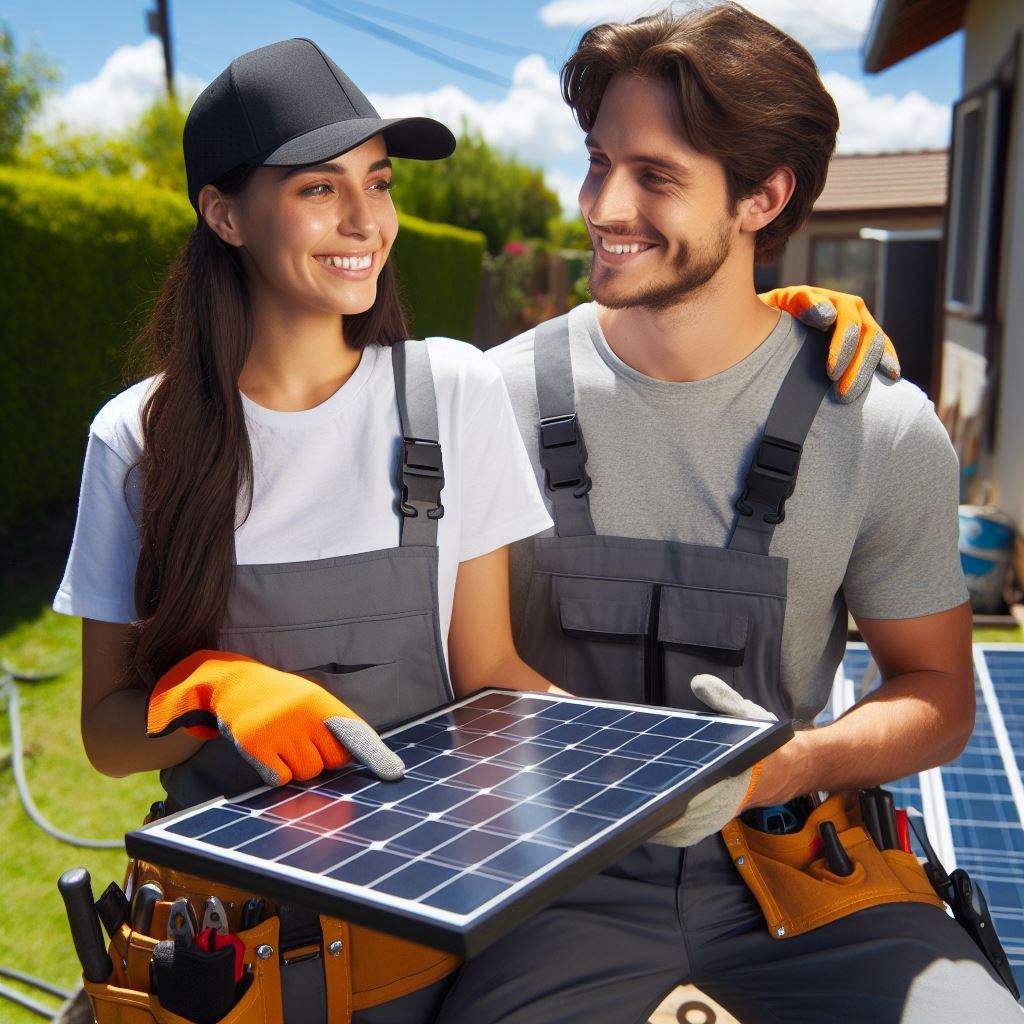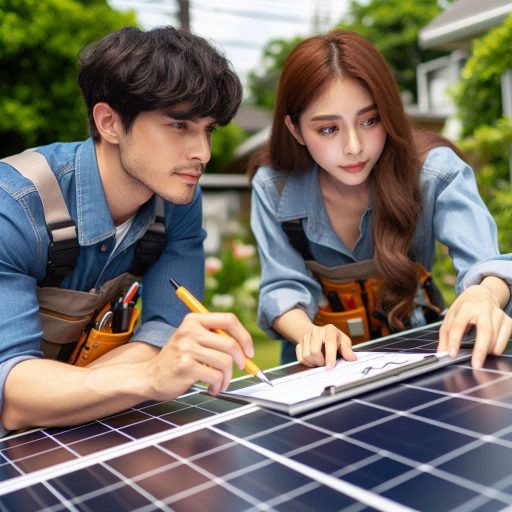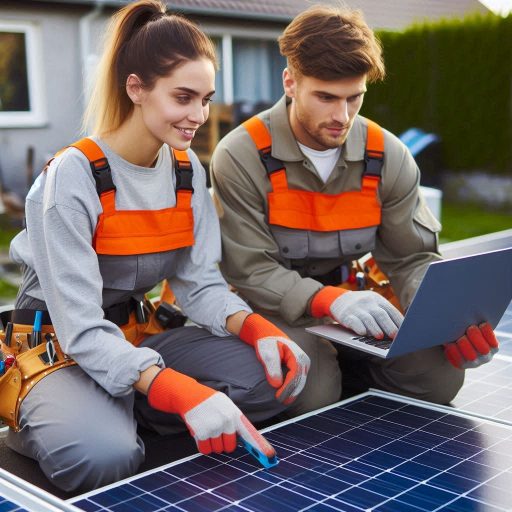Introduction
Solar photovoltaic (PV) installers are vital to the renewable energy industry, playing a key role in harnessing solar power to create a more sustainable future.
Their primary responsibility is to install and maintain solar panel systems, which convert sunlight into electricity.
This process is essential for the widespread adoption of solar energy, as it directly affects the efficiency and effectiveness of solar installations.
To succeed in this career, several key skills are crucial.
First, technical expertise is vital.
Installers need a thorough understanding of electrical systems, solar panel technology, and installation techniques.
This knowledge allows them to effectively handle complex systems and troubleshoot any issues that arise during the installation process.
They must also be familiar with various types of solar panels and mounting systems, as well as the integration of these systems into existing electrical networks.
Physical stamina and dexterity are also important skills for solar PV installers.
The job often involves working at heights, lifting heavy equipment, and performing physically demanding tasks.
Installers need to be able to navigate rooftops and other installation sites safely while handling tools and materials with precision.
Strong problem-solving abilities are essential for overcoming challenges that may arise during installation.
Technical Knowledge
Understanding of Solar Energy Systems and Components
Successful solar photovoltaic (PV) installers must have a thorough understanding of solar energy systems and components.
They should know how solar panels convert sunlight into electricity.
Installers need to be familiar with key components such as inverters, batteries, and mounting systems.
Understanding how these elements work together ensures proper installation and system performance.
Installers should also be knowledgeable about different types of solar panels and their efficiencies.
This knowledge helps in selecting the right equipment for each installation.
A solid grasp of solar energy systems is crucial for troubleshooting and optimizing solar PV systems.
Ability to Read Blueprints and Technical Diagrams
Reading blueprints and technical diagrams is a vital skill for solar PV installers.
Installers must interpret detailed schematics that outline system layouts and wiring configurations.
Understanding these diagrams ensures accurate placement of panels, inverters, and other components.
Blueprints provide crucial information on electrical connections and mounting specifications.
Being able to read and follow technical diagrams prevents errors during installation.
This skill also helps in planning the layout to maximize energy production and efficiency.
Accurate interpretation of blueprints and diagrams contributes to the overall success of the solar installation project.
Knowledge of Electrical Systems and Building Codes
A comprehensive knowledge of electrical systems and building codes is essential for solar PV installers.
Installers must understand electrical circuits, wiring, and safety protocols to ensure a safe installation.
Knowledge of local and national building codes ensures that installations meet regulatory requirements.
This includes understanding requirements for electrical grounding, conduit installation, and panel mounting.
Compliance with building codes prevents legal issues and ensures system safety and reliability.
Installers should stay updated with changes in electrical codes and regulations.
Proper knowledge of electrical systems and codes is critical for maintaining high standards and ensuring the functionality of the solar PV system.
Basically, successful solar photovoltaic installers must possess a deep understanding of solar energy systems and their components.
They should be skilled in reading blueprints and technical diagrams to ensure accurate installations.
Knowledge of electrical systems and building codes is also crucial for compliance and safety.
Mastering these skills allows installers to efficiently design, install, and maintain solar PV systems.
Their expertise directly impacts the effectiveness and safety of solar energy solutions, making these skills essential for a successful career in solar PV installation.
Problem-Solving Skills
Ability to Troubleshoot and Diagnose Issues with Solar PV Systems
Successful solar photovoltaic (PV) installers must have a strong ability to troubleshoot and diagnose issues with solar PV systems.
They need to identify problems such as wiring faults, inverter malfunctions, or panel issues.
Technicians use diagnostic tools and techniques to pinpoint the exact cause of system failures.
Effective troubleshooting involves understanding system schematics and performance data.
Installers must also test electrical components and connections to ensure they function correctly.
Accurate diagnosis helps in resolving issues swiftly, ensuring the system operates at peak efficiency.
This skill is crucial for maintaining system reliability and customer satisfaction.
Critical Thinking Skills to Quickly Find Solutions to Problems on the Job
Critical thinking skills are essential for solar PV installers to find solutions to problems quickly on the job.
Installers must evaluate complex situations and determine the best course of action.
They analyze various factors that could affect system performance and devise effective solutions.
Critical thinking involves assessing potential risks and benefits of different repair or adjustment options.
Installers use logical reasoning to address unexpected issues that arise during installation or maintenance.
This skill helps in making informed decisions and solving problems efficiently, minimizing downtime and maximizing system performance.
Adaptability to Changing Conditions and Unexpected Challenges
Adaptability is a key skill for solar PV installers when facing changing conditions and unexpected challenges.
Installers often work in diverse environments with varying weather conditions and site-specific issues.
They must adjust their techniques and approaches based on these changing factors.
For instance, installers may need to modify installation plans due to structural constraints or weather-related delays.
Adaptability also involves being prepared for unforeseen problems that arise during the installation process.
Flexibility in responding to these challenges ensures that installers can complete projects successfully and maintain high-quality standards.
Therefore, successful solar photovoltaic installers need a blend of critical skills.
Their ability to troubleshoot and diagnose issues with solar PV systems ensures reliable performance.
Critical thinking helps them quickly find solutions to problems on the job.
Adaptability enables them to handle changing conditions and unexpected challenges effectively.
Mastering these skills allows installers to manage complex installations and maintain high standards of work, contributing to the success of solar energy projects.
Safety Training
Knowledge of Safety Protocols and Regulations Related to Working with Solar Panels
Solar photovoltaic (PV) installers must have a thorough understanding of safety protocols and regulations.
Working with solar panels involves handling electrical components and working at heights, which presents specific hazards.
Installers need to be familiar with national and local safety codes to ensure compliance.
These regulations cover everything from electrical safety to the proper use of personal protective equipment (PPE).
Knowledge of safety protocols helps prevent accidents and injuries on the job.
Installers should regularly review and stay updated on safety standards to maintain a high level of safety awareness.
Adhering to these regulations not only ensures personal safety but also protects clients and the integrity of the installation.
Experience with Proper Handling and Installation Techniques to Prevent Accidents
Proper handling and installation techniques are crucial for preventing accidents during solar panel installations.
Installers should be trained in the correct methods for lifting and positioning solar panels to avoid injury.
They need to use the appropriate tools and equipment to ensure secure and accurate installation.
Knowledge of best practices for securing panels and connecting electrical components is essential.
Installers should follow manufacturer guidelines and industry standards to avoid common pitfalls.
Experience with these techniques allows installers to work efficiently and safely.
Proper training and hands-on experience help them handle unexpected challenges and maintain high safety standards throughout the installation process.
Commitment to Maintaining a Safe Work Environment for Oneself and Others
A strong commitment to maintaining a safe work environment is vital for solar PV installers.
This commitment starts with personal responsibility and extends to ensuring safety for team members and clients.
Installers should consistently follow safety procedures and encourage their colleagues to do the same.
Regularly inspecting tools and equipment for wear or damage helps prevent accidents.
Creating and maintaining a clean and organized work area reduces the risk of slips, trips, and falls.
Installers should also be proactive in identifying and addressing potential hazards before they lead to incidents.
By fostering a culture of safety and adhering to best practices, installers contribute to a safer working environment and reduce the likelihood of accidents and injuries.
In general, knowledge of safety protocols and regulations, experience with proper handling and installation techniques, and a commitment to maintaining a safe work environment are essential skills for successful solar PV installers.
These elements ensure that installations are performed safely and effectively, protecting both the installer and the client.
By prioritizing safety and following established guidelines, solar PV installers can enhance their professionalism and contribute to the overall success of renewable energy projects.
Read: Continuing Education for Radiologic Technologists

Communication Skills
Ability to Effectively Communicate with Team Members, Clients, and Other Stakeholders
Effective communication is crucial for solar photovoltaic (PV) installers.
The ability to interact well with team members, clients, and other stakeholders directly impacts project success.
Clear communication fosters teamwork and ensures that everyone involved understands their roles and responsibilities.
This coordination is vital for maintaining project timelines and achieving high-quality results.
Communicating with stakeholders, such as suppliers or regulatory bodies, also requires professionalism and clarity.
Effective communication helps in coordinating deliveries, meeting regulatory requirements, and ensuring that all aspects of the installation process proceed smoothly.
Maintaining positive relationships with these stakeholders can benefit future projects and collaborations.
Confidence in Explaining Technical Information in a Clear and Understandable Way
When working with clients, installers must confidently explain technical information in a clear and understandable way.
Many clients may not have a technical background, so breaking down complex concepts into simple terms is essential.
Providing clear explanations helps clients understand the benefits of their investment and the functioning of their system, leading to higher satisfaction levels.
Confidence in explaining technical details builds trust with clients and reassures them that the installer is knowledgeable and capable of handling their solar PV system.
This approach helps clients make informed decisions about their solar installations and builds their confidence in the process.
Strong Listening Skills to Understand and Address Customer Concerns
Strong listening skills are equally important for solar PV installers.
They need to understand and address customer concerns accurately.
By actively listening, installers can identify specific client needs and preferences, ensuring that the installation meets their expectations.
This attentiveness helps in resolving any issues or misunderstandings that may arise during the project.
Listening skills enhance customer service and improve the overall client experience.
Addressing concerns promptly and accurately fine-tunes the installation to better meet customer needs and preferences.
Effective listening also contributes to stronger client relationships and a more successful project outcome.
Generally, the ability to communicate effectively with team members, clients, and stakeholders is vital for solar PV installers.
Confidence in explaining technical information clearly, coupled with strong listening skills, helps address customer concerns and enhances overall project success.
Mastering these skills will position installers for success and contribute to their reputation as reliable and skilled professionals in the renewable energy industry.
Read: Common Mistakes in Quality Control Inspections
Physical Fitness
Physical Strength and Stamina for Heavy Equipment and Challenging Environments
Successful solar photovoltaic installers must possess physical strength and stamina.
The job involves lifting heavy solar panels and equipment.
Installers often work in various weather conditions and on uneven surfaces.
Their role requires carrying tools and materials up ladders or scaffolding.
The physical demands can be strenuous, making strength and endurance crucial.
Installers may spend long hours on their feet, requiring consistent energy and resilience.
The ability to handle physically demanding tasks ensures efficiency and safety during installations.
Overall, physical strength and stamina are essential for performing the job effectively and safely.
Transform Your Career Today
Unlock a personalized career strategy that drives real results. Get tailored advice and a roadmap designed just for you.
Start NowAgility for Navigating Rooftops and Structures
Agility is another key skill for solar photovoltaic installers.
Navigating rooftops and other elevated structures requires balance and coordination.
Installers must move efficiently and safely while carrying equipment or adjusting panels.
Working at heights poses risks, making agility crucial for maintaining stability and preventing accidents.
Installers often work in confined or awkward spaces, requiring flexibility and quick reflexes.
Their ability to maneuver around obstacles and adjust to different installation environments enhances their performance.
Agility ensures that installers can complete tasks with precision while minimizing safety hazards.
Wellness Practices for Maintaining Health and Energy Levels
Maintaining overall health and energy levels is vital for solar photovoltaic installers.
Long days on the job demand sustained physical and mental stamina.
Wellness practices help installers stay healthy and perform at their best.
Regular exercise strengthens the body and improves endurance, reducing fatigue.
A balanced diet provides essential nutrients and energy for demanding work.
Adequate hydration prevents dehydration and supports overall well-being.
Proper rest and sleep are crucial for recovery and maintaining focus during installations.
Implementing wellness practices helps installers manage the physical and mental demands of their job effectively.
In review, successful solar photovoltaic installers need physical strength, agility, and wellness practices to thrive in their roles.
Physical strength and stamina enable them to handle heavy equipment and work in challenging environments.
Agility ensures they can safely navigate rooftops and structures during installations.
Wellness practices, including regular exercise, a balanced diet, and adequate rest, are essential for maintaining health and energy levels.
By developing these key skills, installers can perform their duties efficiently, safely, and with sustained energy throughout long workdays.
Read: CAD Technician vs. Draftsman: Key Differences
Time Management
Organization Skills to Plan and Prioritize Tasks Efficiently
Successful solar photovoltaic installers must excel in organization skills.
They need to plan and prioritize tasks efficiently to ensure smooth project execution.
Proper organization involves scheduling installation tasks and coordinating with team members.
Installers must manage the workflow, including material procurement and site preparation.
Effective organization helps avoid delays and ensures that each phase of the project is completed on time.
Installers use checklists and project management tools to track progress and maintain order.
By staying organized, they can address any issues promptly and keep the project on track.
This skill is essential for handling multiple tasks and meeting project goals.
Ability to Meet Deadlines and Complete Projects on Time
Meeting deadlines and completing projects on time is crucial for solar photovoltaic installers.
Installers work with tight schedules, often dictated by client needs and project requirements.
They must ensure that installations are completed within the agreed timeframe.
Timely project completion is important for customer satisfaction and maintaining a good reputation.
Installers plan their work carefully, allocate resources efficiently, and stay focused on their tasks.
They manage any obstacles that arise to keep the project moving forward.
By meeting deadlines, installers demonstrate their reliability and commitment to quality work.
Timeliness is a key factor in the success of solar installation projects.
Flexibility to Adapt to Changing Schedules and Unexpected Delays
Flexibility is essential for solar photovoltaic installers to adapt to changing schedules and unexpected delays.
Projects can face unforeseen challenges such as weather conditions or supply chain issues.
Installers must adjust their plans and schedules accordingly to accommodate these changes.
They need to remain adaptable and find solutions to keep the project on track.
Flexibility allows installers to manage last-minute adjustments and reschedule tasks as needed.
Being able to respond quickly to unexpected events ensures that the installation process remains efficient and effective.
This adaptability is crucial for handling the dynamic nature of solar installation projects and maintaining project momentum.
In essence, key skills for successful solar photovoltaic installers include strong organization skills, the ability to meet deadlines, and flexibility.
Organizing tasks efficiently ensures smooth project execution and timely completion.
Meeting deadlines demonstrates reliability and commitment to quality.
Flexibility allows installers to adapt to changing schedules and overcome unexpected delays.
These skills are essential for managing the complexities of solar installation projects and achieving success in the field.
Read: Best Online Courses for CAD Technician Training
Customer Service Skills
Attentiveness to Customer Needs and Preferences During Installations
Successful solar photovoltaic (PV) installers must be attentive to customer needs and preferences throughout the installation process.
Listening carefully to client requirements helps ensure that the installation meets their expectations.
Installers should ask detailed questions about the client‘s energy goals and any specific preferences they have for the solar system.
This attentiveness enables installers to tailor the installation to fit the client’s unique needs, such as optimizing panel placement for maximum sunlight exposure.
A personalized approach enhances the overall client experience and contributes to the system’s effectiveness.
By addressing customer preferences, installers can also reduce the likelihood of post-installation adjustments or complaints.
This client-focused approach builds a positive relationship and fosters satisfaction with the completed work.
Professionalism in Interactions with Clients to Build Trust and Satisfaction
Professionalism is crucial for solar PV installers to build trust and satisfaction with clients.
From the initial consultation to the final installation, maintaining a professional demeanor is essential.
Installers should communicate clearly and effectively, explaining the installation process and answering any questions clients may have.
This transparency helps clients understand what to expect and builds confidence in the installer‘s expertise.
Dressing appropriately and arriving on time for appointments further demonstrates professionalism.
Respecting the client‘s property and maintaining a clean work area shows consideration and respect.
Professionalism also involves handling any issues or changes with grace and efficiency.
By consistently displaying a professional attitude, installers can establish a reputation for reliability and competence, which leads to higher client satisfaction and potential referrals.
Patience and Empathy to Address Concerns and Provide Exceptional Service
Patience and empathy are key skills for addressing client concerns and providing exceptional service.
Solar PV installations can involve complex processes that may be confusing or stressful for clients.
Installers must approach these situations with patience, taking the time to explain technical details and answer questions thoroughly.
Empathy allows installers to understand and address any concerns clients may have about the installation process or the performance of their solar system.
By acknowledging and validating their feelings, installers can ease anxieties and build rapport.
Providing clear and reassuring information helps clients feel confident and informed.
Exceptional service goes beyond completing the installation; it involves creating a positive experience and ensuring that clients are satisfied with the outcome.
Patience and empathy enhance the overall client relationship and contribute to a successful and fulfilling installation process.
In summary, successful solar PV installers must excel in attentiveness, professionalism, patience, and empathy.
Attentiveness ensures installations meet client needs, professionalism builds trust and satisfaction, and patience and empathy address concerns and enhance service quality.
Mastering these skills helps installers deliver exceptional service and contributes to the overall success of solar energy projects.
Discover More: Internship Opportunities for Lab Technicians
Conclusion
The role of a successful solar photovoltaic (PV) installer hinges on a variety of key skills.
Essential technical proficiency includes expertise in system installation, maintenance, and troubleshooting.
Installers must accurately set up solar panels, ensure optimal system performance, and address any issues that arise.
Attention to detail is critical for both the installation process and ongoing system checks.
Strong problem-solving abilities enable installers to diagnose and resolve technical issues efficiently.
Additionally, effective communication skills are crucial for collaborating with clients and team members.
Clear communication helps in understanding client needs and explaining technical details comprehensively.
Continuous learning and development play a significant role in this ever-evolving field.
Solar technology advances rapidly, with new techniques and regulations frequently emerging.
Staying informed through ongoing training and certification is essential for maintaining expertise and adapting to industry changes.
We encourage aspiring solar PV professionals to focus on honing these skills for a rewarding career in renewable energy.
Mastering both technical and soft skills, while embracing a commitment to continuous education, will position you for success.
By investing in these areas, you not only enhance your career prospects but also contribute to a sustainable future.
[E-Books for Sale]
The Big Book of 500 High-Paying Jobs in America: Unlock Your Earning Potential
$19.99 • 500 High-Paying Jobs • 330 pages
Explore 500 high-paying jobs in America and learn how to boost your career, earn more, and achieve success!
See All 500 High-Paying Jobs of this E-Book
1001 Professions Without a Degree: High-Paying American Jobs You Can Start Now
$19.99 • 1001 Professions Without a Degree • 174 pages
Discover 1001 high-paying jobs without a degree! Unlock career tips, skills, and success strategies for just $19.99!




